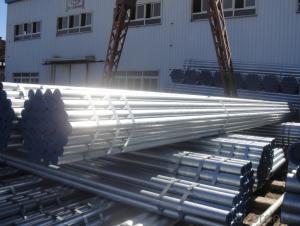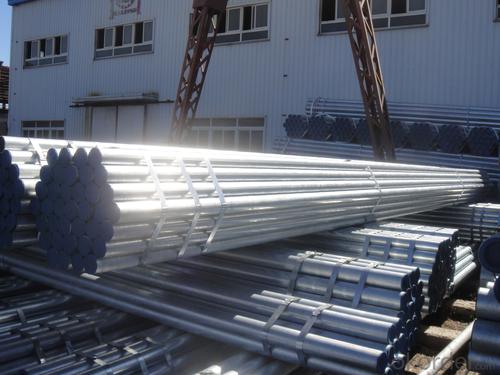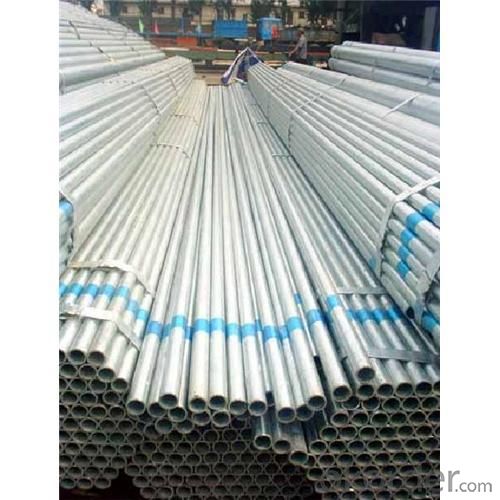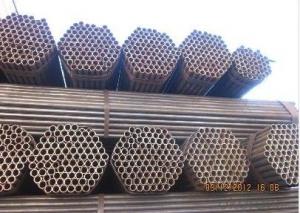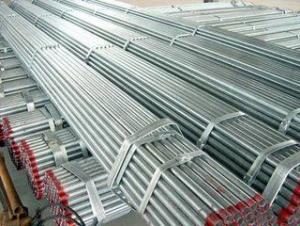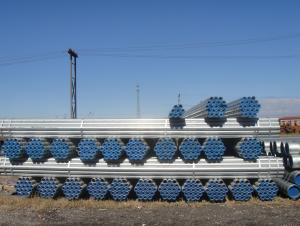GOOD QUALITY FACTORY GI PIPE PRICE LIST
- Loading Port:
- Tianjin
- Payment Terms:
- TT or LC
- Min Order Qty:
- 25 m.t.
- Supply Capability:
- 10000 m.t./month
OKorder Service Pledge
OKorder Financial Service
You Might Also Like
1、Structure of GI PIPE PRICE LIST FROM China top 500 enterprise:
Hot Dipped Galvanized Steel Pipe,Steel-plastic Compound Pipe,ERW Steel Pipe,Square And Rectangular Steel Pipe
2、Main Features of GI PIPE PRICE LIST FROM China top 500 enterprise:
• High manufacturing accuracy
• High strength
• Small inertia resistance
• Strong heat dissipation ability
• Good visual effect
• Reasonable price
3、GI PIPE PRICE LIST FROM China top 500 enterpriseSpecification:
Standard | GB, DIN, ASTM ASTM A106-2006, ASTM A53-2007 |
Grade | 10#-45#, 16Mn 10#, 20#, 45#, 16Mn |
Thickness | 8 - 33 mm |
Section Shape | Round |
Outer Diameter | 133 - 219 mm |
Place of Origin | Shandong, China (Mainland) |
Secondary Or Not | Non-secondary |
Application | Hydraulic Pipe |
Technique | Cold Drawn |
Certification | API |
Surface Treatment | factory state or painted black |
Special Pipe | API Pipe |
Alloy Or Not | Non-alloy |
Length | 5-12M |
Outer Diameter | 21.3-610mm |
Grade | 20#, 45#, Q345, API J55, API K55, API L80, API N80, API P110, A53B |
Standard | ASME, ASTM |
1) Material:20#(ASTM A 106/A53 GRB.API5LGRB,GB),45#,16Mn,10#.
2) Specification range:OD:21.3-610mm,WT:6-70mm,length:6-12m or according to the requirement of clients.
3) Excutive standards:GB,ASME API5L.ASTM A 106/A53,Despite of the above standards,we can also supply seamless steel pipe with standard of DIN,JIS,and so on,and also develop new products according to the requirements of our clients!
4) Surface:black lacquered,varnish coating or galvanized.
5) Ends:Beveled or square cut,plastic capped,painted.
6) Packing:bundles wrapped with strong steel strip,seaworthy packing.
4、Packaging & Delivery
Packaging Details: | seaworthy package,bundles wrapped with strong steel strip |
Delivery Detail: | 15-30days after received 30%TT |
5、FAQ of GI PIPE PRICE LIST FROM China top 500 enterprise:
①How is the quality of your products?
Our products are manufactured strictly according to national and internaional standard, and we take a test
on every pipe before delivered out. If you want see our quality certifications and all kinds of testing report, please just ask us for it.
Guaranteed: If products’ quality don’t accord to discription as we give or the promise before you place order, we promise 100% refund.
②How about price?
Yes, we are factory and be able to give you lowest price below market one, and we have a policy that “ for saving time and absolutely honest business attitude, we quote as lowest as possible for any customer, and discount can be given according to quantity”,if you like bargain and factory price is not low enough as you think, just don’t waste your time.Please trust the quotation we would give you, it is professional one.
③Why should you chose us?
Chose happens because of quality, then price, We can give you both.Additionally, we can also offer professional products inquiry, products knowledge train(for agents), smooth goods delivery, exellent customer solution proposals.Our service formula: good quality+good price+good service=customer’s trust
SGS test is available, customer inspection before shipping is welcome, third party inspection is no problem.
6、GI PIPE PRICE LIST FROM China top 500 enterpriseImages:
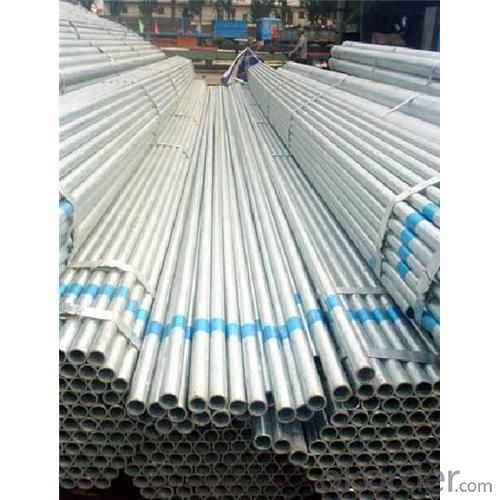
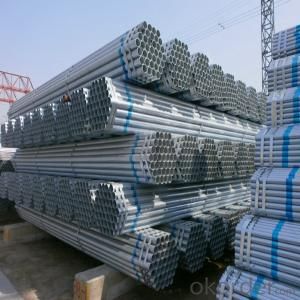
- Q: Can steel pipes be used for architectural purposes?
- Yes, steel pipes can be used for architectural purposes. Steel pipes are often used in construction projects for structural support, such as in the construction of buildings, bridges, and stadiums. They are also commonly used for architectural design elements, such as handrails, staircases, and decorative features. The durability, strength, and versatility of steel pipes make them a popular choice in architectural applications.
- Q: How do you calculate the pipe flow velocity coefficient for steel pipes?
- The Manning's equation is employed to determine the flow velocity in open channels and pipes, taking into consideration the hydraulic radius, slope, and roughness coefficient of the pipe. By applying this equation, the pipe flow velocity coefficient for steel pipes can be calculated. To ascertain the pipe flow velocity coefficient for steel pipes, the following steps should be followed: 1. Calculate the hydraulic radius (R) of the steel pipe by dividing the cross-sectional area (A) of the pipe by the wetted perimeter (P). The formula to use is R = A/P. 2. Determine the slope (S) of the pipe, which is the change in elevation divided by the length of the pipe. Usually, it is expressed as a ratio or a percentage. 3. Obtain the roughness coefficient (n) of the steel pipe, representing the internal roughness of the pipe. This information can be found in literature or pipe manufacturer specifications, often given in terms of the Manning's roughness coefficient. 4. Insert the values of hydraulic radius (R), slope (S), and roughness coefficient (n) into the Manning's equation: V = (1/n) * R^(2/3) * S^(1/2) where V signifies the flow velocity. 5. Solve the equation for V to calculate the pipe flow velocity coefficient for steel pipes. It is crucial to note that the calculated velocity coefficient may differ depending on specific pipe dimensions, flow conditions, and other factors. Therefore, it is advisable to consult relevant engineering standards or seek guidance from a hydraulic engineer to ensure accurate and reliable calculations for specific applications.
- Q: Are steel pipes suitable for industrial cooling systems?
- Yes, steel pipes are suitable for industrial cooling systems. They are highly durable, resistant to corrosion, and can withstand high pressures and temperatures. Additionally, steel pipes have excellent heat transfer properties, making them efficient for cooling applications.
- Q: What is the difference between carbon steel and cast iron pipes?
- Carbon steel and cast iron pipes are both widely used in various industries for different applications. The main difference between these two types of pipes lies in their composition and properties. 1. Composition: Carbon steel pipes are primarily made of iron and carbon, with trace amounts of other elements such as manganese, phosphorus, and sulfur. On the other hand, cast iron pipes are made by melting iron and adding a small amount of carbon, usually between 2-4%. 2. Strength and Durability: Carbon steel pipes are generally stronger and more durable than cast iron pipes. Carbon steel has a higher tensile strength, which means it can withstand higher pressures and is less likely to be damaged or deformed. Cast iron, although strong, is more brittle and prone to cracking. 3. Corrosion Resistance: Carbon steel pipes require additional coatings or treatments to protect them from corrosion. Without proper protection, carbon steel pipes can be susceptible to rust and corrosion, especially when exposed to moisture or aggressive substances. On the other hand, cast iron pipes have inherent corrosion resistance due to the formation of a protective layer of iron oxide (rust) on their surface. 4. Weight and Installation: Cast iron pipes are typically heavier than carbon steel pipes, making them more challenging to handle and install. Carbon steel pipes are comparatively lighter, allowing for easier transportation and installation. 5. Noise and Vibration: Cast iron pipes have superior sound-deadening properties, making them quieter when fluids flow through them. On the contrary, carbon steel pipes tend to transmit more noise and vibrations. 6. Cost: Cast iron pipes are generally more expensive than carbon steel pipes due to the additional manufacturing processes and the higher cost of raw materials. In summary, the main differences between carbon steel and cast iron pipes lie in their composition, strength, corrosion resistance, weight, noise transmission, and cost. The choice between the two depends on the specific application, budget, and environmental factors.
- Q: How to make the magnetic steel, can be like a magnet?
- Of course, not all materials can be magnetized, austenitic stainless steel will not do.
- Q: What is the diameter of the steel tube DN20?
- Stress: the nominal diameter is not the outer diameter of the pipe, nor the inner diameter of the tube. It is not the average value of the inside and outside diameter (the nominal diameter of the equipment refers to the outer diameter).
- Q: Are steel pipes resistant to electromagnetic interference?
- Yes, steel pipes are generally resistant to electromagnetic interference due to their conductive properties. The metallic nature of steel helps to create a shielding effect, preventing the penetration of electromagnetic waves and reducing interference.
- Q: What is the role of steel pipes in the aerospace industry?
- Steel pipes in the aerospace industry serve various critical roles, primarily in the construction of aircraft structures and engines. They are commonly used for fuel and hydraulic systems, as well as for carrying pressurized air and gases. Steel pipes provide strength, durability, and resistance to high temperatures and pressure, ensuring the safety and reliability of aerospace components. Additionally, they contribute to fuel efficiency by reducing weight and minimizing fuel leakage.
- Q: Can steel pipes be used for conveying slurry?
- Yes, steel pipes can be used for conveying slurry. Steel pipes are widely used in various industries for transporting different types of fluids, including slurry. Slurry is a mixture of solid particles suspended in a liquid, and steel pipes are well-suited for handling such mixtures due to their strength, durability, and resistance to corrosion. Steel pipes are also known for their high-pressure and high-temperature capabilities, making them suitable for conveying slurry in demanding applications such as mining, dredging, and wastewater treatment. Additionally, steel pipes can be easily welded, allowing for the construction of long pipelines that can efficiently transport slurry over long distances. However, it is important to consider the specific characteristics of the slurry being conveyed, such as particle size, density, and abrasiveness, to ensure proper pipe selection and design for optimal performance and longevity.
- Q: Can steel pipes be used for underground gas storage?
- Yes, steel pipes can be used for underground gas storage. Steel pipes are commonly used in underground gas storage facilities due to their strength, durability, and resistance to corrosion. They provide a reliable and secure means of storing and transporting gas underground.
Send your message to us
GOOD QUALITY FACTORY GI PIPE PRICE LIST
- Loading Port:
- Tianjin
- Payment Terms:
- TT or LC
- Min Order Qty:
- 25 m.t.
- Supply Capability:
- 10000 m.t./month
OKorder Service Pledge
OKorder Financial Service
Similar products
Hot products
Hot Searches
Related keywords
